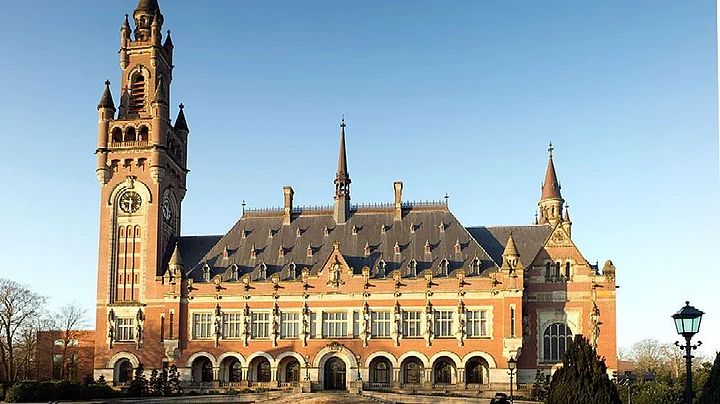The International Court of Justice (ICJ) at Hague, which is one of the six principal organs of the United Nations, is hearing an application by Ukraine on Monday, 7 March, where it has accused Moscow of violating and abusing the genocide convention to justify a military operation against the country.
Kyiv is expected to argue that Moscow's justification for the attack – "to protect people who have been subjected to bullying and genocide" – is based on an opportunistic and faulty interpretation of genocide law.
Russian President Vladimir Putin, before announcing the "special military action," had said that the operation was meant to protect those in eastern Ukraine whose first or only language is Russian.
It is with this justification that Putin sent troops into Donetsk and Luhansk, the first step in what would culminate into a full-scale invasion of Ukraine.
Ukraine's petition in the ICJ argues that the claim of genocide made by the Russian president is untrue, and does not provide any legal justification for the invasion whatsoever.
The application is based on Article IX of the 1948 Genocide Convention.
What Does the Convention Say?
The Convention on the Prevention and Punishment of the Crime of Genocide is an international treaty legally criminalising the specific act that genocide is, and even makes it obligatory for all states party to the convention to enforce the treaty.
According to Article IX, the ICJ is responsible for resolving disputes between the conflicting parties “relating to the interpretation, application or fulfilment” of the 1948 Convention.
The most important part of the convention is Article III, which points out certain acts, that, "committed with intent to destroy, in whole or in part, a national, ethnical, racial or religious group" constitute genocide.
These acts, verbatim, are:
(a) Killing members of the group
(b) Causing serious bodily or mental harm to members of the group
(c) Deliberately inflicting on the group conditions of life calculated to bring about its physical destruction in whole or in part
(d) Imposing measures intended to prevent births within the group
(e) Forcibly transferring children of the group to another group.
'Absolutely No Evidence'
The executive board of the International Association of Genocide Scholars issued a statement last week, stating that Vladimir Putin was "misappropriating and misusing the term 'genocide'".
"There is absolutely no evidence that there is a genocide going on in Ukraine," the president of the association, Melanie O'Brien, told Reuters.
The ICJ has announced that public hearings will be for the case.
Ukraine will present its oral arguments on Monday, 7 March. Russia will do the same on 8 March.
The problem is that even if the decision goes in favour of Ukraine, there is no real enforcement mechanism of the rulings given by the ICJ, despite the binding nature (over the parties) of the rulings.
On the other hand, in the unlikely scenario, if the top court of the UN rules that there is indeed a genocide taking place in Eastern Ukraine, then the Genocide Convention makes it mandatory for the nations party to it to act against Ukraine.
(At The Quint, we question everything. Play an active role in shaping our journalism by becoming a member today.)
